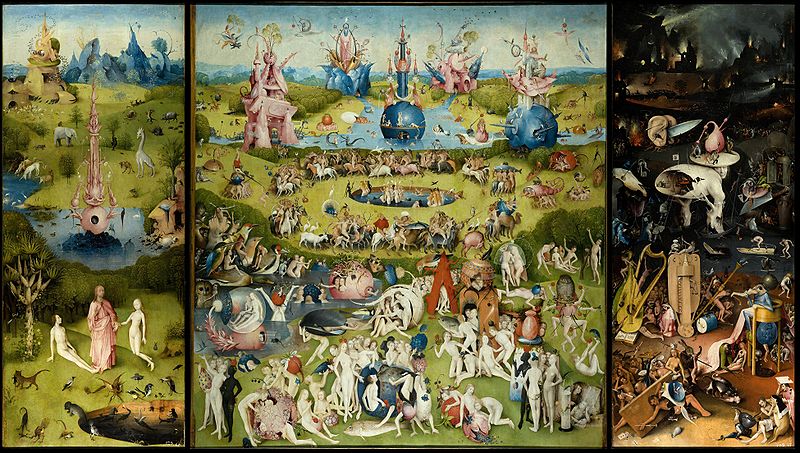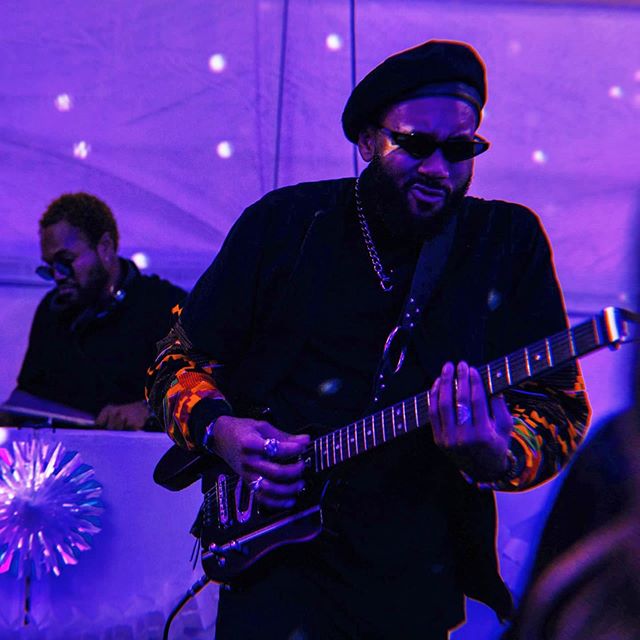- About Us
- Columns
- Letters
- Cartoons
- The Udder Limits
- Archives
- Ezy Reading Archive
- 2024 Cud Archives
- 2023 Cud Archives
- 2022 Cud Archives
- 2021 Cud Archives
- 2020 Cud Archives
- 2015-2019
- 2010-2014
- 2004-2009
 |
Earthly Delights: |
Hieronymus Bosch’s early sixteenth-century masterpiece, The Garden of Earthly Delights, tells a three-part story of humanity’s fall from grace. The left panel is of Eden and the moment God presents Eve to Adam, whereas the right is a graphic depiction of Hell, with accompanying darkness and fire and torture. The middle panel is in many ways the main event. It represents a fantastical and salacious homage to hedonism, its landscape filled with nude figures engaging in sensory and carnal pleasure. According to Phill Celeste, the man behind Life on Planets, the song Airwaves — his most recent collaboration with producer David Marston — was inspired by the idea of being stuck forever in this middle panel of Bosch’s famous triptych. “I had a vision in my head of being one of the figures in the Garden of Earthly Delights, where everyone is captured in that position for all of time.”
It represents a fantastical and salacious homage to hedonism, its landscape filled with nude figures engaging in sensory and carnal pleasure. According to Phill Celeste, the man behind Life on Planets, the song Airwaves — his most recent collaboration with producer David Marston — was inspired by the idea of being stuck forever in this middle panel of Bosch’s famous triptych. “I had a vision in my head of being one of the figures in the Garden of Earthly Delights, where everyone is captured in that position for all of time.”
I met Celeste and Marston at Nostrand Cafe in Brooklyn late last year to discuss Airwaves, a toe-tapping track that twists and turns around Celeste’s soaring vocals and poetic lyrics. It’s their third collaboration after Take Your Time and the heavily acclaimed Fork In The Path, the latter a masterclass in musical deconstruction and progression. At first blush, they seem an unlikely duo. Celeste, from suburban Maryland, has a background in jazz and as Life on Planets weaves his magnetic voice around a sound that melds soul, bossa nova, R&B and house. Marston, from Kingston, Jamaica, produces mostly instrumental music and grew up loving reggae.
However, like all great collaborations, they complement and balance each other. “I love working with a vocalist like Phill,” said Marston. “His music has a cerebral, lyrical side which is so beautiful. It’s very informed and littered with references to literature and art.” A white Jamaican with high cheekbones and an aquiline nose, Marston came to the US for boarding school and then attended the University of Pennsylvania. When asked about his musical idols he lists Third World, a Jamaican band from the 1970s, and the British electronic producer and DJ, Matthew Herbert. “I’ve also been listening to Afrobeats a lot recently.” His upbringing in the Caribbean has left an indelible mark on his musical sensibility: “Jamaica has such a rich, dense musical history and culture and I bring my fondness for it to my producing.”
Celeste, wearing a dark cap, denim jacket and sporting a fashionable beard, sailed to the cafe on his black bicycle, the embodiment of effortless cool. Hailing from Gaithersburg, less than an hour from Baltimore, he grew up playing bass, drums, saxophone and clarinet. “In elementary and middle school I never listened to popular music. Instead, I listened to older music, like jazz.” It was only when Celeste went to college and studied fine art that he first picked up a guitar. “I fell in love with it. I started writing songs and jamming whenever I had the chance. I was skipping class all the time to play music and ended up flunking out of school, busking on the streets of Baltimore.”
What’s striking about Life on Planets is the incredible range to Celeste’s sound, from the thumping beats of his 2016 album, Cosmic Dub, to the slow disco grooves displayed in his 2017 EP, Maze, and the hip hop and trap elements in his more recent work. “I’ve been going back and reacquainting myself with the music I used to be into when I was first getting into guitar, particularly flamenco. I’m also listening to a lot of the jazz masters like Herbie Hancock.” In spite of this eclecticism and experimentation, he’ll always be a guitarist at heart. “My biggest musical inspirations are Jimi Hendrix, Miles Davis and the Belgian jazz guitarist Django Reinhardt. All three are godfathers of individual sounds.” With all this in mind, I asked him how he would classify the genre of music he is currently creating. He took a sip of his chai. “One person commented on my Instagram and all he said was ‘Drake House’. I’m pretty happy with that,” he said, smiling.
A few weeks after our meeting, Marston announced he was leaving New York and moving to London. At his farewell event at Black Flamingo, an intimate venue in East Williamsburg that’s been a “second home” to him, he played a phenomenal DJ set, wowing devotees with disco, soul and reggae-infused house music. A self-described “perfectionist”, his execution was flawless and his song choice was creative and irreverent. The highlight of the night was when Celeste joined Marston behind the decks and they performed an up-tempo version of Airwaves. The chorus, where Celeste hit his crescendo, begins, “In the Garden of Earthly Delights. We stand to warn against certain plights” and ends, “Laurel leaves adorn your head, Don’t rest too long, don’t rest those legs.” For those lucky enough to be at Black Flamingo that Saturday night, there was no danger of resting legs.
The intricate detail of Hieronymus Bosch’s The Garden of Earthly Delights means that every time you look at it closely, you’re likely to see something you hadn’t noticed before. Lending your ears to Phill Celeste and David Marston is a similar experience. The combination of their genre-bending approach and raw musical talent means every time they team up, you’re likely to be pleasantly surprised and hear something new too.
Oli Duchesne is an Australian freelance writer currently based in Brooklyn, New York. He is the creator of Curio, a weekly newsletter for curious minds seeking an escape from the noise of the news cycle.
